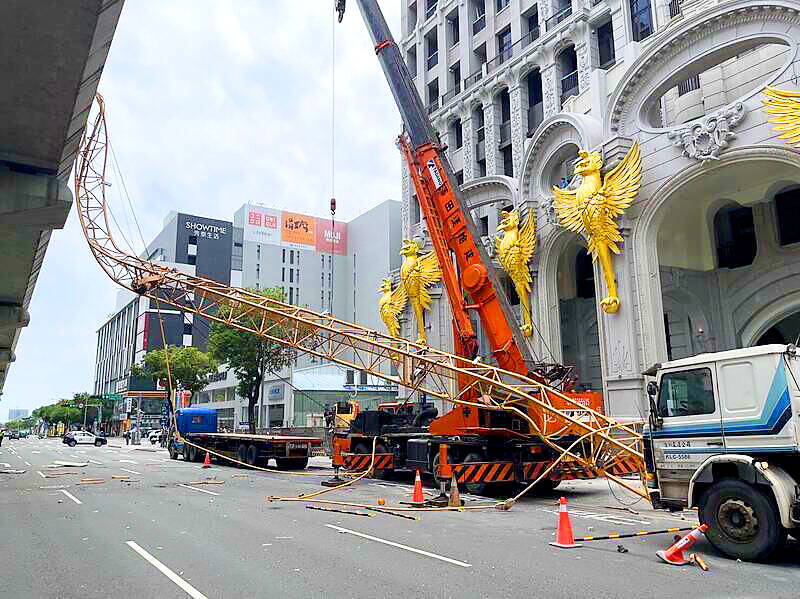Prosecutors on Wednesday indicted two workers on charges of negligent manslaughter when a Taichung MRT train crashed into a crane boom that had fallen on the rail tracks, killing one person and injuring 15 others.
No charges were filed against Highwealth Construction Corp, the project operator of the construction site near the MRT route, and three other companies involved in the incident in May last year.
Highwealth had commissioned Chyi Yuh Construction Co to carry out the project. Chyi Yuh outsourced the tower crane operations on the top floor to United Machinery International Enterprise Co, which later commissioned an engineering company, Chia Yuan, to dismantle the crane structure on the day of accident.

Photo courtesy of the Taichung City Government
Last year, the Taichung District Prosecutors’ Office summoned eight on-site construction personnel involved in the crane operations, along with a train attendant and an MRT platform security guard as witnesses.
Four of them were suspected of committing offenses ranging from endangering public safety to negligent injury and manslaughter, the office said at the time.
The head of Chyi Yuh, surnamed Tsai (蔡), was released on bail of NT$500,000, and the head of Chia Yuan, surnamed Liu (劉), was freed on bail of NT$300,000.
The two workers who were operating the crane, surnamed Lu (呂) and Hsu (許), were released on bail of NT$200,000 each.
Other workers and witnesses were unconditionally let go.
Lu was operating the crane under instructions from Hsu, who did not follow the code of practice and chose to horizontally move the crane when he realized its bolt and rotating disc were stuck, resulting in the diagonal shear that dropped the crane boom onto the tracks, the office said, adding that they failed to pay due attention and committed offenses of negligent injury.
However, due to insufficient evidence, Tsai, the operations supervisor, and Liu — both of whom were working on the first floor — as well as the four companies and the personnel under their charge would not be prosecuted, the office said yesterday.
The Control Yuan had conducted an official inquiry and issued a corrective measure ordering the Ministry of Labor’s Occupational Safety and Health Administration and Taichung Mass Rapid Transit Corp to make improvements. The Taiwan Transportation Safety Board completed its investigation in June.

POSITIVE DEVELOPMENT: Japan and the US are expected to hold in-depth discussions on Taiwan-related issues during the meeting next month, Japanese sources said The holding of a Japan-US leaders’ meeting ahead of US President Donald Trump’s visit to China is positive news for Taiwan, former Japan-Taiwan Exchange Association representative Hiroyasu Izumi said yesterday. After the Liberal Democratic Party’s landslide victory in Japan’s House of Representatives election, Japanese Prime Minister Sanae Takaichi is scheduled to visit the US next month, where she is to meet with Trump ahead of the US president’s planned visit to China from March 31 to April 2 for a meeting with Chinese President Xi Jinping (習近平). Japan and the US are expected to hold in-depth discussions on Taiwan-related issues during the

‘LIKE-MINDED PARTNER’: Tako van Popta said it would be inappropriate to delay signing the deal with Taiwan because of China, adding he would promote the issue Canadian senators have stressed Taiwan’s importance for international trade and expressed enthusiasm for ensuring the Taiwan-Canada trade cooperation framework agreement is implemented this year. Representative to Canada Harry Tseng (曾厚仁) in an interview with the Central News Agency (CNA) said he was increasingly uneasy about Ottawa’s delays in signing the agreement, especially as Ottawa has warmed toward Beijing. There are “no negotiations left. Not only [is it] initialed, we have three versions of the text ready: English, French and Mandarin,” Tseng said. “That tells you how close we are to the final signature.” Tseng said that he hoped Canadian Prime Minister Mark Carney

Taiwan has received more than US$70 million in royalties as of the end of last year from developing the F-16V jet as countries worldwide purchase or upgrade to this popular model, government and military officials said on Saturday. Taiwan funded the development of the F-16V jet and ended up the sole investor as other countries withdrew from the program. Now the F-16V is increasingly popular and countries must pay Taiwan a percentage in royalties when they purchase new F-16V aircraft or upgrade older F-16 models. The next five years are expected to be the peak for these royalties, with Taiwan potentially earning

President William Lai (賴清德) yesterday bestowed one of Taiwan’s highest honors on Saint Vincent and the Grenadines (SVG) Ambassador Andrea Clare Bowman in recognition of her contributions to bilateral ties. “By conferring the Order of Brilliant Star with Grand Cordon on Ambassador Bowman today, I want to sincerely thank her, on behalf of the Taiwanese people, for her outstanding contribution to deepening diplomatic ties between Taiwan and SVG,” Lai said at a ceremony held at the Presidential Office in Taipei. He noted that Bowman became SVG’s first ambassador to Taiwan in 2019 and